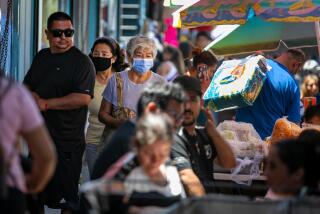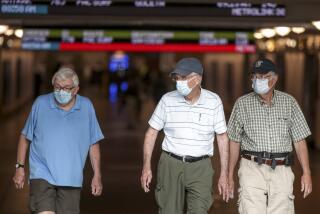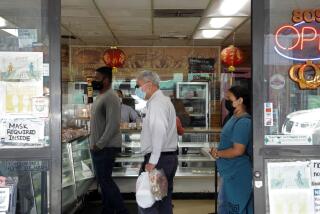Column: Is it time for L.A. to become a real party pooper to fight the spread of COVID-19?
- Share via
We’re shuttering businesses, inspecting workplaces and re-imagining education to keep COVID-19 at bay.
But we’re all thumbs when it comes to dealing with what has become the Achilles’ heel of our coronavirus prevention plan: rogue parties that have helped send infection rates soaring among young people in Los Angeles County.
It seems like almost every week some illicit event with super-spreader potential makes news — at a mansion in the Hollywood Hills, a celebrity compound in Calabasas, an estate in Holmby Hills, a warehouse in the industrial Harbor Gateway neighborhood.
Police show up but don’t do much — unless a partygoer gets shot, which has happened during at least three recent events, including a Hollywood Hills party where a woman died. Elected officials seem to have little to offer but threats to cut power to venues that are “egregious” offenders. And health experts keep hoping that education about the risks will persuade partygoers to stay home.
You’d have to live in a cave right now not to know what precautions to take to keep yourself safe from contagion: Wash your hands, wear a mask, keep your distance from anyone you don’t live with.
Yet some folks are still living it up — unmasked and unafraid — as if COVID-19 didn’t exist. Party videos show jam-packed dance floors, crowds queued up at makeshift bars and buses continually dropping newcomers off.
I understand the urge that drives the lack of inhibition. We are all weary of being masked, monitored and cooped up. For young people, in the prime of their partying days, it must seem especially cruel.
You’re impatient and bored, tired of social isolation and desperate for company. You can’t go to school, your job is on hold, the county’s bars and clubs have shut down. And you’ve been attuned by social media to expect instant gratification. So you convince yourself that you’re entitled to a night of raucous fun.
But your indiscretions can wind up threatening the health of anyone else you encounter. So maybe it’s time for us to acknowledge that the ‘We’re all in this together’ mantra rings hollow in some quarters. We may need to rely on punishment instead.
::
Los Angeles County Public Health Director Barbara Ferrer has been watching the progression of infections with trepidation. More than a quarter of new cases have been among 18- to 29-year-olds, a group that was mostly untouched in the pandemic’s early days. Now they have the highest rate of new cases of any age group.
“I don’t like to see those pictures of all the people partying,” she said. “When we see people blatantly defying sensible orders, that makes others feel like, ‘If they can do it, we can do it too.’ It’s frustrating, because what we’re asking is not a big thing to do. It’s not saying parties are banned forever, it’s just saying don’t have a party for a few months.”
Ferrer admits that some responsibility for the violations may be linked to well-meaning officials and fumbles early on — when we were all trying to figure out how best to deal with a deadly virus we had never encountered before.
“Months ago we were telling people they didn’t need to wear a mask,” she recalled. “Now masks are lifesaving.… People are confused about messages we think should be clear.”
Ferrer spends a lot of time asking strangers what they do to stay safe, and that’s been eye-opening.
“I’m actually astounded how little understanding they have about what the science is around COVID-19,” she said. “We obviously haven’t done as good a job as we need to do in explaining to people how powerful they can be in stopping the spread.”
Or maybe that message is just particularly hard for young people to absorb.
“They look around, and it doesn’t seem to be causing all this devastation,” Ferrer said, because until now mostly older people had been dying. “They say, ‘I’m young, I’m healthy, and I’m tired of not being able to socialize the way I want.’”
::
The county is revamping its messaging to reach young people who seem to think they are invincible. Billboards, videos and social media posts now feature people in their 20s and 30s who suffered and still haven’t recovered from coronavirus infections. It’s a “scared straight” approach for young folks who might be wavering.
But is fear of getting sick enough to stave off the party circuit? I don’t think so.
When I see those party videos, I think of all the young people I know who are sacrificing and staying at home to protect themselves, their mothers, aunties, grandfathers. They are tired of the isolation, too. And we dishonor their commitment when we turn a blind eye to those who brazenly break the rules, threatening public health with their selfishness.
Education instead of enforcement is a nice sentiment, but maybe it’s time to raise the stakes for those determined to flout public safety rules.
We have to accept that some folks just don’t care about health risks. But maybe they’ll care when their party favors are tickets for mask violations — subject to $100 fines or community service.
Other communities have already taken that sort of hard line.
Calabasas declared “zero tolerance” a month ago, after a raid on a large party hosted by YouTube star Jake Paul.
“The warning period has ended,” Mayor Alicia Weintraub declared in a Facebook post. “The sheriff understands that all parties are to be broken up immediately.”
But in the city of Los Angeles, strained relations between the LAPD and Mayor Eric Garcetti mean enforcement isn’t on the table yet. They’re stuck on logistics, confusion over whether the mayor’s “Safer L.A.” order applies to parties in private homes and concern that enforcement orders would force a standoff with police, whose union is at war with the mayor over proposed budget cuts.
Police were called several times by neighbors, worried by the chaos around the Mulholland Drive mansion where three people would be shot earlier this month. But when the LAPD arrived, the officers tended to parking problems, then “met with the responsible party” hosting the event and helped usher “the people back into the private party,” LAPD Lt. Chris Ramirez said at a media briefing.
As if anyone at that party could really be considered “responsible.” When that’s the police response, it’s easy to understand why partygoers think “no harm, no foul.”
I asked Ferrer what she thinks about adding enforcement to the arsenal.
“Every tool we have, we should use,” she said. She likes the idea of big fines for party hosts.
That doesn’t mean Ferrer thinks people should be arrested for being scofflaws in these situations.
“I respect the fact that law enforcement has a lot of work to do,” she said. “Arresting everybody at a party? What are we going to do? Put them all on a bus, book them and release them?”
Besides, a crowded bus taking people to jail is the perfect place for the coronavirus to spread.
And yet, back in June, that’s exactly what we did to thousands of lawful young protesters, who took to the streets to try to stop an epidemic of police brutality.
More to Read
Sign up for Essential California
The most important California stories and recommendations in your inbox every morning.
You may occasionally receive promotional content from the Los Angeles Times.











